
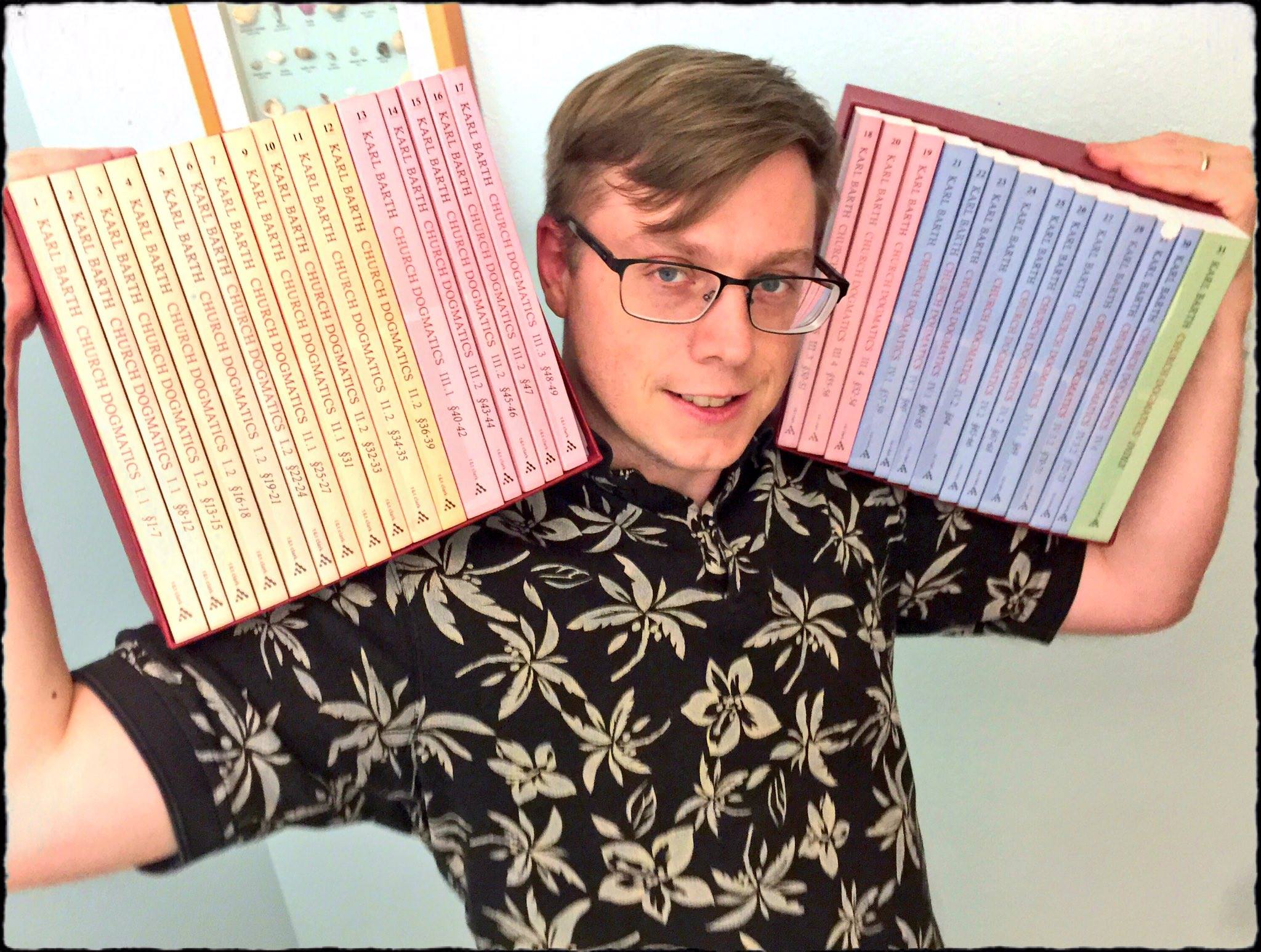 Wyatt Houtz after finishing reading Karl Barth's Church Dogmatics (Nov 11, 2016)
Wyatt Houtz after finishing reading Karl Barth's Church Dogmatics (Nov 11, 2016)About Wyatt Houtz
The PostBarthian is dedicated to Ecumenical Reformed Theology. Our theology is Reformed because it begins with the works of Reformed theologians such as Karl Barth and Jürgen Moltmann and contemporaries, but it also includes the entire Reformed tradition stretching back to John Calvin, Huldrych Zwingli and Martin Luther. Our theology is also Ecumenical because we learn from theologians and churches outside the Reformed tradition, including Catholic, Orthodox, and Pentecostal—wherever truth is found. The purpose of the PostBarthian is to unify the church and world through our common creed that Jesus is Lord, while simultaneously disputing for the truth of Jesus Christ.
Our favorite theologians include (in no particular order) Karl Barth, Jürgen Moltmann, Wolfhart Pannenberg, Karl Rahner, Hans Küng, Rudolf Bultmann, C.H. Dodd, N.T. Wright, James H. Cone, John Calvin, Augustine, Zwingli, and many others.
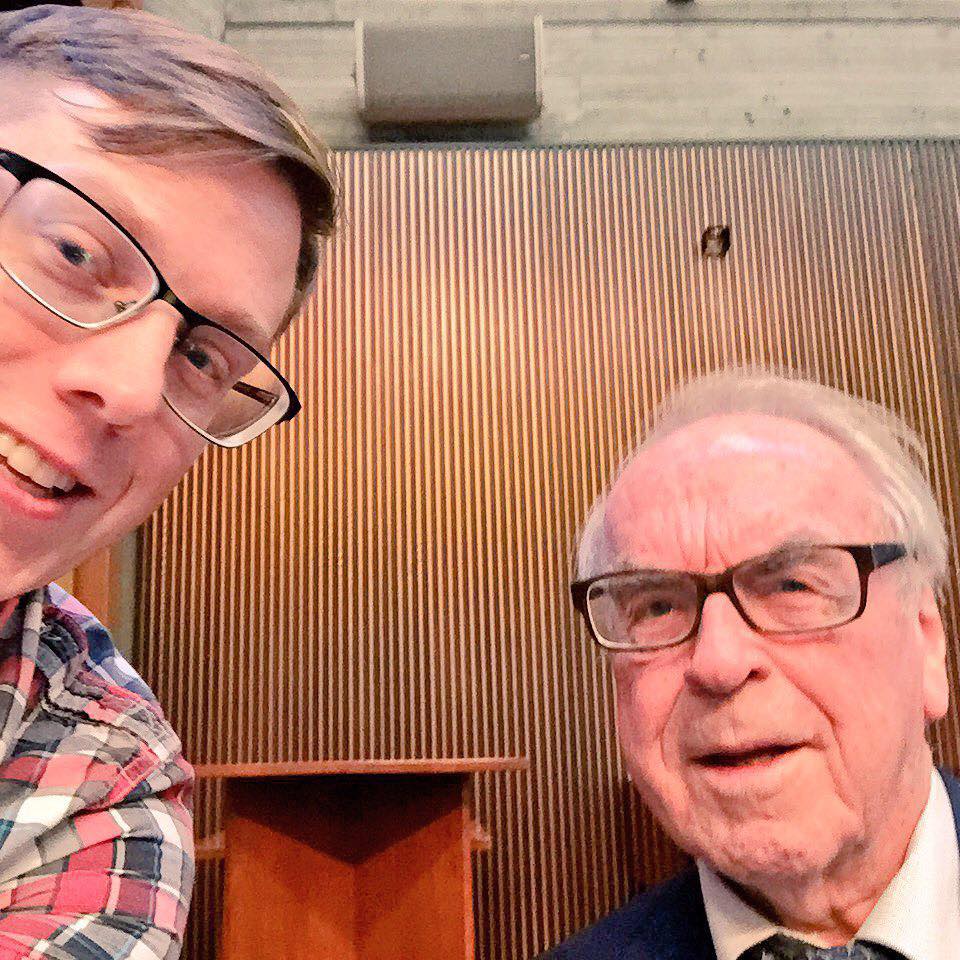
Wyatt and Moltmann
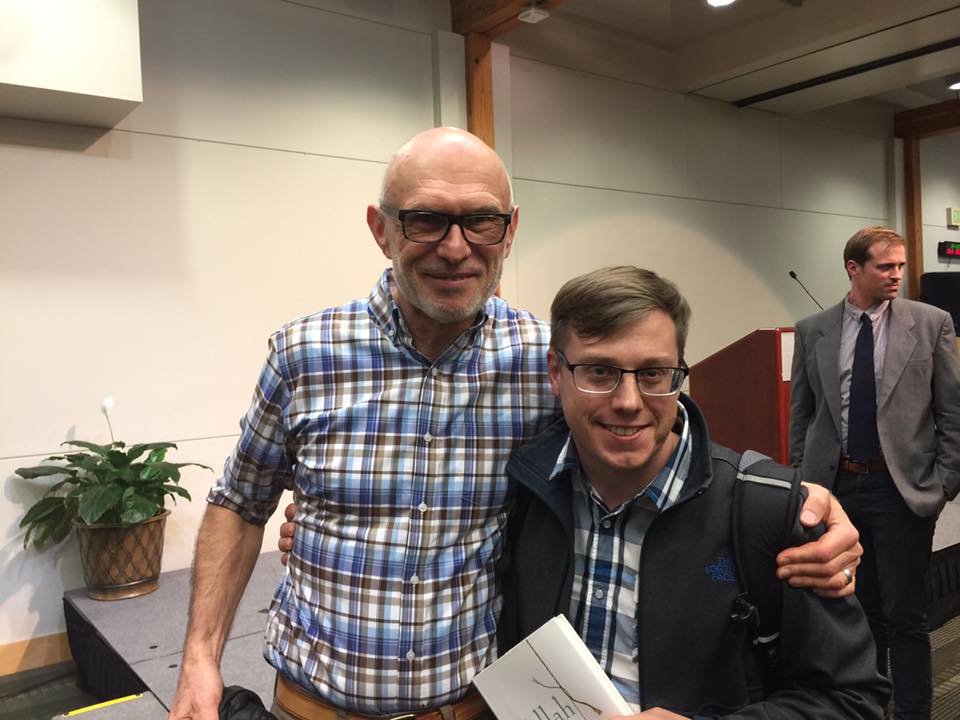
Wyatt and Miroslav Volf in an "embrace"
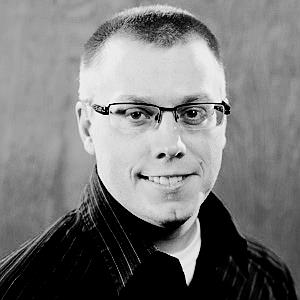
Pastor Wyatt Houtz @ Mars Hill Church (Seattle)
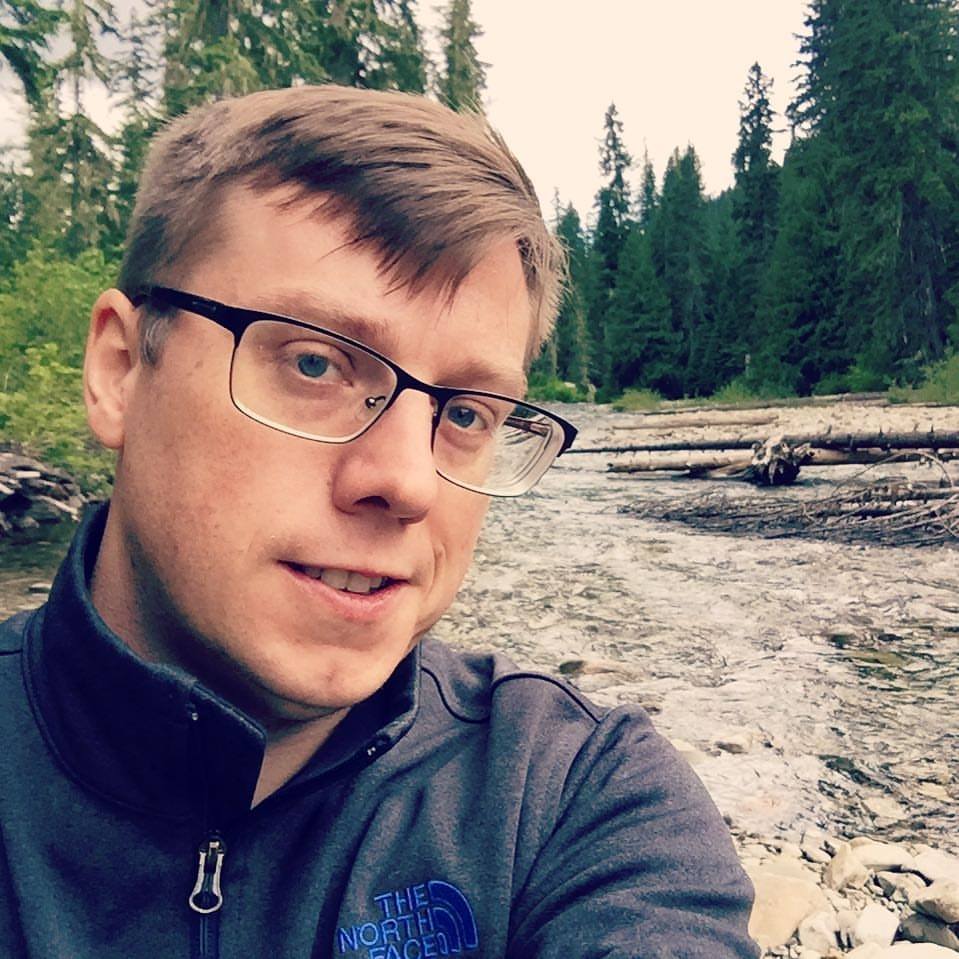
Wyatt in the Pacific Northwest.
Wyatt Houtz is the primary contributor to the PostBarthian. He resides in Woodinville, WA on the east side of Seattle with his lovely wife, Tracy, and their adorable children: Zoraida, Augustine, Pascal and Anastasia. Wyatt currently a member of the Presbyterian Church (PCUSA) and is a member of the Karl Barth Society of North America (KBSNA). Wyatt was previously a pastor at Mars Hill Church in Seattle (2011-2013), and was a church planter in the Presbyterian Church of America (PCA) in 2014-2016
In addition to this website, follow us here:
- Twitter: @PostBarthian
- Facebook: https://www.facebook.com/postbarthian
- GoodReads: https://www.goodreads.com/user/show/11606068-wyatt-houtz
- BookLog: https://postbarthian.com/booklog/


May 20th, 2014 - 15:11
Hi Wyatt,
So nice of you to visit my site! Your post was thoroughly enjoyable, and I look forward to following your posts. I’m just starting to blog more seriously, so there’s a lot I still have to learn. I actually reside in seattle as well, so maybe one day I’ll run into you!
May 30th, 2014 - 09:12
It’s been great stuff so far, I’ll keep checking it!
October 2nd, 2014 - 06:02
Wyatt
Thanks for some very helpful information about Calvin and the heliocentric debate of the 16th century. I agree with you that whether or not Calvin was fully abreast of the issues then, his general approach in both Genesis and the Psalter commentaries lends weight to the argument that he certainly wasn’t “anti-scientific” in his understanding of natural revelation.
Grace and peace,
-mra
October 3rd, 2014 - 21:17
Thanks Martin!
July 10th, 2016 - 11:50
Calvinists were split on the issue of geocentrism vs. heliocentrism, just as Christians have been split over many other questions of biblical interpretation from Genesis to Revelation.
See,THE CALVINIST COPERNICANS: The Reception of the New Astronomy in the Dutch Republic, 1575- 1750 by Rienk Vermij. Amsterdam, The Netherlands: Royal Netherlands Academy of Arts & Sciences, 2003; especially Part IV. Biblical Authority and Christian Freedom, that discusses Protestant Resistance to Heliocentrism based on biblical texts. By 1656 Copernicanism became the center of a debate over biblical interpretation that virtually split the Dutch Reformed Church.
See also https://edward-t-babinski.blogspot.com/2010/10/does-bible-teach-geocentrism.html
September 30th, 2015 - 03:12
Have you ever thought about going into the PCUSA where your views could be appreciated?
December 14th, 2016 - 23:32
I’m ecumenical. So I love both the PCA and PCUSA. I’m currently attending a PCUSA church.
January 6th, 2016 - 17:12
If you are Barthian, the PCA should not permit you membership. Barth was neo-orthodox which is incompatible with the biblical and reformed faith. Does your pastor know about your embracing of Barth?
January 6th, 2016 - 18:21
Barth emphatically rejected the label of Neo-Orthodox.
January 6th, 2016 - 20:38
Calling Barth “neo-orthodox” is ignorant and idiotic, especially since he began with the biblical and reformed faith. Shame on KB’s reformed brothers and sisters who don’t see him as a kindred spirit and can’t for whatever reason distinguish him from the neo-orthodox (Tillich, Brunner, et al.).
January 7th, 2016 - 22:21
I’d like to follow this conversation but forgive me, as a German the abbreviations mentioned don’t make any sense to me. Can someone give me the meanings of PCUSA, PCA and KB? 🙂
December 14th, 2016 - 23:30
PCUSA is the largest Presbyterian church in the USA. PCA is a smaller presbyterian church in the USA. KB is Karl Barth.
April 7th, 2016 - 08:06
Wyatt just found your website. “Karl Barth’s Letter to Francis Schaeffer” caught my eye on facebook. I am a huge fan of Barth. His work has played a crucial role in rescuing me from fundamentalism.
I’m from Lake Stevens, WA. It’s nice to read from a fellow Barth fan who is also from my neck of the woods. I’m a pastor in Montana now. Keep it coming bro!
May 2nd, 2016 - 21:08
Thanks Able! I think we should get a Karl Barth Seattle meetup sometime.
July 22nd, 2016 - 08:29
Hi Wyatt,
Really grateful for your blog, brother. As a younger member of the PCA, I’ve had a polarizing journey wading through the waters of Two Kingdoms Theology to Neo-Kuyperianism but eventually ended up sympathetic to the Barmen Declaration. This year’s election season only confirmed my suspicions of both approaches. Based on your reading of Barth, would you have any recommendations (both primary and secondary sources) to improve my understanding of his political theology? Thanks for all that you do.
December 14th, 2016 - 23:28
Lee,
I thought I responded to this comment, but I guess not! The Barmen Declaration is a superior political statement to kuyper or R2K theologies. It’s somewhat in the middle, as it allows for a particular lordship over the Church and a general lordship over civilization by Jesus Christ. A great book I recommend is Religion, Revolution, and the Future by Jurgen Moltmann. http://amzn.to/2gNFHp0.
Wyatt
December 15th, 2016 - 02:33
Wyatt, this is the first I have read of your “about” page. I would say you are fulfilling your mission. I like most of your list of favorite theologians. I would probably not add that last phrase “everyone else.” I do not think you have much appreciation for fundamentalists! It still amazes me that you have personal experience in that part of the country.
April 26th, 2017 - 18:05
You have some great material. However, your print friendly code is decidedly unfriendly.
April 26th, 2017 - 18:19
Thanks! I can fix that.
June 26th, 2017 - 02:18
So you read all of the Church Dogmatics. WOW! I’d love to know how long it took you to finish. Did you read from start to finish or in a different order?
June 26th, 2017 - 03:07
I read it out of order, and it took about 5 years. I found CD II/1 and CD II/2 at a used book store. They were expensive, but I read them first. Then I bought the hendrickson set. You can see my book log here: https://postbarthian.com/booklog/ but I read CD II/1, II/2, I/1, I/2, then I bought the T&T clark study edition and read III/1, IV/4, IV/1, started III/4, reread some of I/2, reread some of II/2, IV/2, then III/2, started IV/2, III/3, III/4, finished IV/2, IV/3, then IV/4 christian life.
June 28th, 2017 - 21:43
Thanks. Visited your booklog too. Impressive! I have read II.2 and IV.1 in full. Now I want to read them in order. If it took you 5 years, I dont know how long it’ll take me. I am a slow reader. What I might do is to make a new habit of reading a little Barth everyday. That way I dont need to stop reading other books until I get through the CD’s. So daily dose of Barth CD’s from today!!
June 28th, 2017 - 21:50
I read the study editions, so they break up the big volumes in multiple parts, and then I read other books to take a break. It’s a dense but rewarding read! Those two volumes are among the best in the dogmatics. So great choice! Don’t miss CD III/2!
June 28th, 2017 - 23:12
I have the study edition plus the old T&T edition. For some strange reason I prefer reading the old edition. I check the study edition when I need the translation. I’m weird I know!
September 5th, 2017 - 00:50
Kindly add me to your email list for updates
November 14th, 2017 - 07:41
Yow! I admire your articles, it is quite exquisite, I am Ecumenical too yet Evangelical-Reformed, anyway, denomination don’t matter to me. Karl Barth, Wolfhart Pannenberg, Dietrich Bonhoeffer & Jürgen Moltmann indeed shaped my worldview today this German guys are genius and wow! It made impact in my Christian life, i included N.T. Wright which I admire his biblical work. Looking forward for more post from Hans Küng, Karl Rahner, Rudolf Bultmann, Walter Brueggemann & other scholars from other traditions. Keep it up bro, stay cool! 👍🏻
November 14th, 2017 - 07:41
Yow! I admire your articles, it is quite exquisite, I am Ecumenical too yet Evangelical-Reformed, anyway, denomination don’t matter to me. Karl Barth, Wolfhart Pannenberg, Dietrich Bonhoeffer & Jürgen Moltmann indeed shaped my worldview today this German guys are genius and wow! It made impact in my Christian life, i included N.T. Wright which I admire his biblical work. Looking forward for more post from Hans Küng, Karl Rahner, Rudolf Bultmann, Walter Brueggemann & other scholars from other traditions. Keep it up bro, stay cool!
December 11th, 2017 - 16:54
Hi, Wyatt:
I live in Seattle, too.
I’m doing a dissertation on an aspect of Karl Barth’s theology.
Is it possible to send you an email?
All the best,
Mark Haukaas
December 23rd, 2017 - 21:40
Thanks very much for the Martin Luther page on The Great Exchange. We can never get enough of this for faith and joy and assurance. This is reminiscent of what Markus Peter Johnson posited in his first book “One With Christ” (Crosswa pub) and underscores the need to understand what Christ did for us to just begin to enter into the breadth of the possibilities of enjoying the fact that Christ took on himself all that we are (our wretchedness). Johnson points to “the unasumed is the unhealed” of Nazianzus motif on how Christ in the incarnation achieved that exchange citing Torrance.
Any thoughts.
Thanks!
Leonard
Cambridge (Harvard Extension)
March 6th, 2018 - 02:23
Is there any way to subscribe to receive these blog updates via email? I may be being stupid but I can’t seem to find anywhere to do this on the site.
March 7th, 2018 - 08:12
I will look into making this easier.
October 3rd, 2018 - 12:33
I am very impressed by your quotation from Moltmann’s book. It is about original sin. It is enlightening me. I have difficulty finding the book. Let me know how to get this book you quots. Moltmann, Jürgen. An Introduction to Christian Theology. Ed. Douglas Meeks. N.p.: Duke, 1968. 194-5. Print
October 3rd, 2018 - 14:19
The book I have is directly from Duke’s library, and isn’t available anywhere else as far as I know. I talked to Douglas Meeks and he said that most of the content has been published in essays elsewhere, so you may be able to find a book with the original sin essay, but I do not know which one has it.
December 31st, 2018 - 10:25
Wyatt, I came out of the PCUSA back in the day. We sent an entire generation of men (and later women) off to Europe to do their PhDs. Many, and these were largely our intellectual leaders, came back enamored of Barth (for whom I have a guarded appreciation, if understood in his own context). That generation presided over a steep decline in denominational membership, losses in youth being especially sharp. My own beloved college pastor at Berkeley, Earl Palmer, was a key figure in west-coast PCUSA leadership. I stumbled onto your blog but don’t want to leave without saying this: the fruit of my generation of Barthians begs important questions for individual and corporate faith.
January 24th, 2019 - 10:46
I’m a member of a PCUSA church in the pacific northwest that’s not far from Palmer’s church here. He retired before I moved to the Seattle area, but I used to listen to some of his sermons. I’ve benefited from Barth, but by many others as well, and thats why I’m post-barthian. The decline in membership is a complicated topic, I know that conservative christians are quick to point at it and blame certain theologies they do not like, but I’m not convinced by that tactic. Barth is lacking, because there is more to be said, in addition to him and through his work, but not by regressing from what he accomplished. Thanks for commenting!
February 12th, 2019 - 14:51
Hello,
Is it possible in your website settings to activate a “Sign up for email updates” option? I like getting an email when a site/blog update is made as it reminds me to check your (wonderful) site. : )
February 12th, 2019 - 15:52
Thank you! I’ll work on that feature request!
October 8th, 2020 - 20:02
Where is Reinhold Niebuhr in your list of Reformed theologians?
October 8th, 2020 - 20:25
Where is Reinhold Niebuhr in your list of Reformed theologians?
January 2nd, 2023 - 10:38
As for your “clobber passages”, you don’t know what you’re talking about. You purposely skip over large swaths of statements against homos. EVERYONE skills Judges Chapter 19 to the very end.
You must think everyone is stupid like you. Really unbelievable.
April 1st, 2023 - 14:34
just found this website today as I was searching for “Karl Barth and pacifism.” hope to learn more about God through this website. Thank you for your contribution.
April 1st, 2023 - 14:36
A bit sad that I could not find the name, “Menno Simons” though.
March 17th, 2024 - 07:41
One cannot unify the Church with Liberation theology (Cone) and neomodernists (Barth and other XX Century Germans), simply because their theology is killing mainstream Protestantism. The future is Evangelical. Insisting in an ahistorical and relativistic theology besides killing mainstream Protestantism will only reinforce fundamentalism.